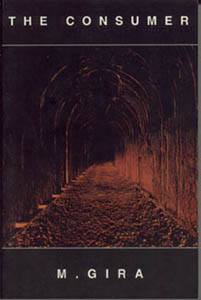Jordon Leigh Bortle
Although his first book, author Michael R. Gira is by no means unfamiliar in expressing the veiled isolation and profound mortality of the human condition in extremis. Since 1982, Gira has been best known for his work in the medium of music as the vision and driving force behind the proto-industrial/post-punk group Swans. Swans delivered to the world a plodding jackhammer lobotomy of sound in lieu of traditional songwriting; a blatant lyrical pummeling of the self and the world in which it exists. To that effect, words were chosen with a caustic minimalist precision, most often pre-occupied with themes of self-loathing, denigration of weakness, submission to authority, greed, lust, and the turmoil of repressed violence.
The threads of those obsessions are also at work here in Gira’s short story collection (or “fairy tales”, as he prefers to call them).
Caveat lector.
With that in mind, the squeamish may wish to armour themselves before entering these pages. The raw ferocity and cutthroat vitality of these words cannot be overstated, fueled by a psychosexual misanthropy akin to the writings of the Marquis de Sade.
Of the forty-seven pieces within its covers the majority behave more as situational vignettes rather than actual stories, ranging from eighteen pages down to nine sentences in length. In Gira’s hands, this approach succeeds with a malicious intent. As the truncated dramas unfold, the reader is exposed to the internal and external landscapes of the hallucinatory and neurotic world of the narrators in a tone that borders the confessional. Here, all taboos are annihilated—incest, alcoholism, obscene torture, rape, cannibalism, and perverse murder have all but become the norm in which these tragic tales occur. Adding leverage to this is the disturbing clarity and muscular tactility in the delivery of these narratives. Dreamlike yet punctuated like stab wounds, they trudge forward in a universe where all things move toward their end. The characters, broken and corrupt, are drowning on the air they breathe. So, Gira in turn forces the reader to choke on language.

What would take another writer more concerned with pretense and style pages to embellish, Gira describes in a paragraph. The sheer honesty of perception (whether it’s real or illusory) hits you in the face like a concrete slab.
The book’s opener, “Empathy” is seemingly at its core a love story, imbued with the perspective of an incestuous acid trip. Set in Los Angeles, a solitary man reflects on events that begin with the arrival of his mentally ill sister, who apparently is responsible for the murder of their parents. Not questioning how or why she was released, he takes her into the one bedroom house he’d purchased with money left to him from the will. From there, the reunion spirals into a maddening symbiosis. The sister feeds on the narrator’s weakness and malleability through sex, as he in turn uses her to define his need and identity. As one might expect, the outcome isn’t pleasant.
“Why I Ate My Wife” dissects the thoughts of a man who, for one reason or another, has lost his wife. She lies before him on a table, leading the reader to assume that he is responsible for her death. Thematically parallel to “Empathy”, a woman, whose sole purpose is to act as a vessel through which the man may escape his own identity, defines his existence. By the process of her murder and ingestion, he believes in a collusion of their essences, in turn giving birth to an organic mixture reaching beyond them both.
In a repugnant and decaying urban landscape, a methamphetamine junkie awaits his last days before a surreal apocalypse in “The Young Man Who Hid His Body Inside A Horse, or, My Vulvic Los Angeles.” Through the pangs of addiction and withdrawal, this tale describes the physical and mental liquidation of the connections to identity. Whether the eventual apocalyptic outcome is real or imagined is irrelevant. The gravity of this story lies within the slow degrees by which a process occurs, toward an ultimate and futile conclusion. No better conveyed is the sickness and alienation of the urbane.
Another, titled “Raping a Slave” is told from a woman’s point of view. Quite simply, it represents an autopsy of sorts; on the mechanics of subservience to the male gender as a disguise of the woman’s complete and unfettered sexual dominance.
Brief descriptions do little justice to the profundity of these narratives. But by using them as a guidemark, one may come away with a sense of purpose in the material which compliments this collection. The unifying link throughout this work demands the reader respond to the frailty of the human soul in search of identity or the disposal thereof; all for the sake of transcendence.
I believe it was Gustave Flaubert who said something to this effect: “The worth of a book can be judged by the strength of the punches it gives and the length of time it takes to recover from them.”
By that dictum, Gira delivers.
